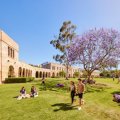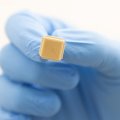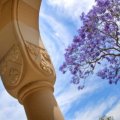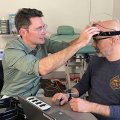The University of Queensland’s Dr Amanda Rasmussen has been awarded a distinguished 2012 Newton international fellowship - awarded jointly by the UK’s national research academies, the British Academy and the Royal Society.
Dr Rasmussen graduated with a Bachelor of Science in Botany and Ecology from UQ.
She later completed a Phd from UQ’s School of Biological Sciences.
Dr Rasmussen's research aims to improve plant root formation in stem cuttings in order to enhance propagation.
She is completing research on a prestigious Marie Curie Fellowship in Belgium.
"Propagation of plants is extremely important for lots of industries from forestry to horticulture and my research aims to ensure these techniques will improve and increase the production of plants for a variety of reasons; even to the point of assisting keen backyard gardeners," said Dr Rasmussen.
Fellowships were awarded to 41 successful applicants who will be investigating topics ranging from the socio-economic impact on women in Ghanaian oil communities to boosting visual short-term memory.
They come from research institutes in over 20 countries including Thailand, Mexico, China and Australia.
The Fellowships are part of a UK government initiative to ensure the UK engages with the world’s most promising academics.
The Newton International Fellowships provide an opportunity for some of the most talented early career post-doctoral researchers working overseas to carry out world class research in UK institutions.
Fellows will receive support in the region of £100,000 ($152 975 AUD) each for a two year fellowship in the UK.
About the School of Biological Sciences
Through research undertaken in the School, UQ has been ranked by the 2012 National Taiwan University Rankings in the top five universities globally for research in ecology and environmental biology and in the top 18 universities globally for plant and animal biology. The UQ School of Biological Sciences attracts researchers of world standing in a range of disciplines, with international leaders in many diverse fields. Our work spans the scales of biological organisation, from molecules and cells to organisms, populations, species and communities.
With more than 150 researchers working in evolution, global change biology, ecology, aquaculture, animal behaviour, physiology, entomology, zoology, botany, genomics, development and conservation biology, our researchers and graduate scientists are well-equipped to make a real difference in contributing to solving global problems.
Media: Tracey Franchi, UQ School of Biological Sciences Communications Manager, +61 7 3365 4831, t.franchi@uq.edu.au
.jpg)










